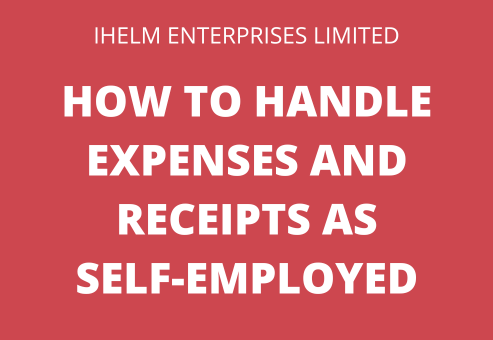During January’s Facebook Live, I talked about how self-employed business owners need to handle their expenses and receipts.
Managing expenses and receipts effectively is one of the cornerstones of successful self-employment. Whether you’re a freelancer, consultant, or entrepreneur, keeping your finances organized ensures you can take full advantage of tax deductions, manage your cash flow, and stay compliant with financial regulations. Here’s a comprehensive guide to help you handle expenses and receipts like a pro.
1. Understand Why Tracking Expenses Matters
As a self-employed worker, every pound you spend on business-related activities can potentially reduce your taxable income. However, you need proper documentation to claim deductions and substantiate your business expenses. Failure to track your expenses can lead to missed opportunities for deductions or even issues during tax audits.
2. Separate Business and Personal Finances
The first rule of managing expenses is to keep business and personal finances separate. Open a dedicated business bank account and use a business credit card for all work-related purchases. This separation simplifies tracking, reduces errors, and makes it easier to prepare financial statements or tax returns.
3. Use Expense Management Tools
Leverage technology to keep track of your expenses. Applications like QuickBooks, Expensify, or other accounting software allow you to record expenses, upload receipts, and even integrate with your bank account for seamless tracking. These tools can generate detailed reports, helping you understand your spending patterns and prepare for tax season.
4. Know What Qualifies as a Business Expense
Understanding what counts as a deductible business expense is crucial. Common categories include:
- Office Supplies: Pens, paper, printers, etc.
- Home Office Deduction: A portion of rent, utilities, and internet if you work from home.
- Travel Expenses: Flights, hotels, and meals for business trips.
- Professional Services: Fees paid to accountants, lawyers, or consultants.
- Marketing and Advertising: Website hosting, social media ads, and promotional materials.
Check the HMRC website or consult a tax professional for a full list of deductible expenses. You could also read some of the blogs I have shared on my website previously: “What expenses can I claim as self-employed” and “What expenses can I claim”.
5. Keep All Receipts
Receipts are your proof of purchase and are essential for claiming deductions. Follow these best practices:
- Go Digital: Scan or photograph physical receipts to ensure you have a backup. Many apps allow you to categorize and store receipts electronically.
- Organize by Category: Use folders or labels to organize receipts by type or month.
- Record Details: Write down the purpose of the expense on the receipt if it’s not obvious.
6. Track Mileage for Business Travel
If you use your personal vehicle for work, you can deduct mileage. Use apps like QBO, MileIQ or Hurdlr to track your trips automatically. Keep a log of dates, destinations, and purposes for each trip to ensure compliance.
7. Reconcile Regularly
Set aside time weekly or monthly to reconcile your expenses. Compare your receipts, credit card statements, and expense tracking tools to ensure everything matches. This regular habit prevents discrepancies and reduces stress during tax season.
8. Retain Records for the Required Period
Tax authorities typically require you to retain financial records for several years. In the UK, if you are self-employed, you must keep your records for 5 years after the 31st of January submission deadline of the relevant tax year. Create a secure storage system, either physical or digital, to ensure you can access records if needed.
9. Work with a Professional
Consider hiring an accountant or bookkeeper to help manage your finances. Professionals can offer insights into optimizing deductions, staying compliant, and planning for taxes. They can also save you time and reduce the likelihood of errors.
10. Review and Adjust Regularly
Your business and expenses may evolve over time. Periodically review your expense management strategy and adjust as needed. For example, as your income grows, you might need more advanced accounting software or a more robust filing system.
Handling expenses and receipts as a self-employed worker doesn’t have to be overwhelming. By staying organized, leveraging tools, and seeking professional advice, when necessary, you can take control of your finances and focus on growing your business. Remember, the key is consistency and attention to detail—small efforts today can save you significant time and money in the future.
If you have any questions about how to handle your expenses and receipts if you are self-employed, please feel free to e-mail me.

